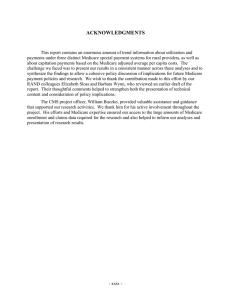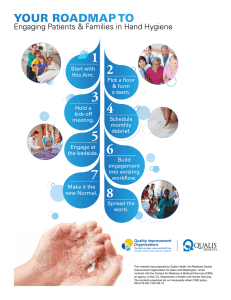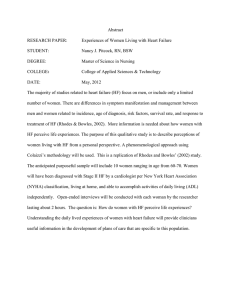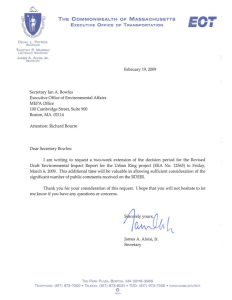Document 14268562
advertisement
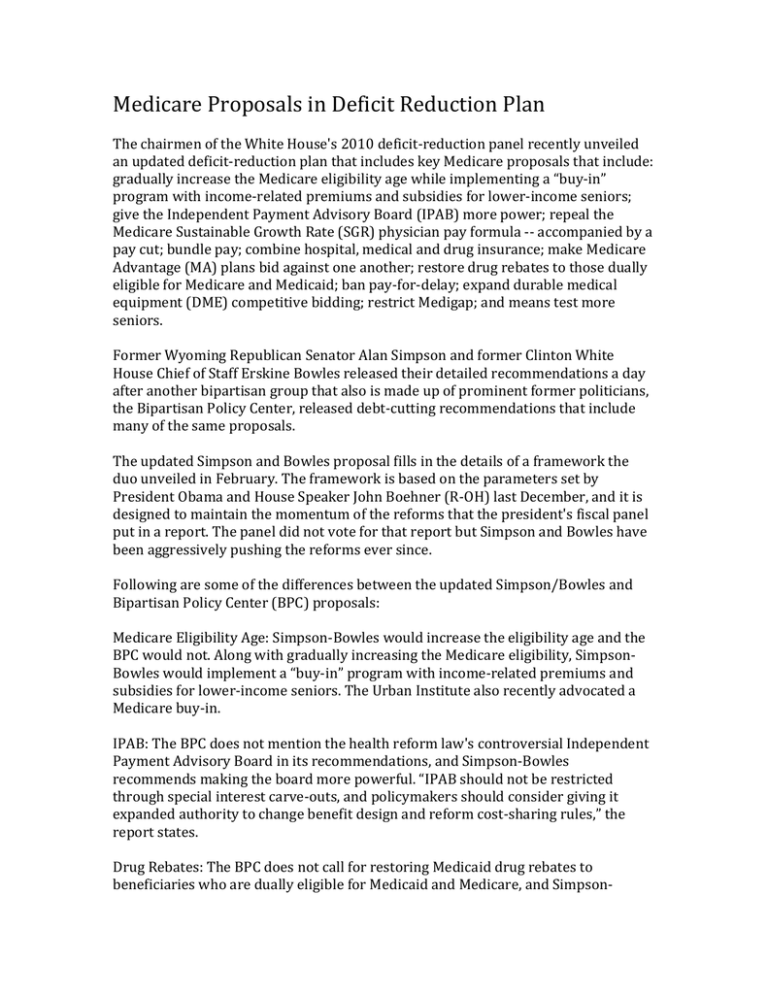
Medicare Proposals in Deficit Reduction Plan The chairmen of the White House's 2010 deficit-­‐reduction panel recently unveiled an updated deficit-­‐reduction plan that includes key Medicare proposals that include: gradually increase the Medicare eligibility age while implementing a “buy-­‐in” program with income-­‐related premiums and subsidies for lower-­‐income seniors; give the Independent Payment Advisory Board (IPAB) more power; repeal the Medicare Sustainable Growth Rate (SGR) physician pay formula -­‐-­‐ accompanied by a pay cut; bundle pay; combine hospital, medical and drug insurance; make Medicare Advantage (MA) plans bid against one another; restore drug rebates to those dually eligible for Medicare and Medicaid; ban pay-­‐for-­‐delay; expand durable medical equipment (DME) competitive bidding; restrict Medigap; and means test more seniors. Former Wyoming Republican Senator Alan Simpson and former Clinton White House Chief of Staff Erskine Bowles released their detailed recommendations a day after another bipartisan group that also is made up of prominent former politicians, the Bipartisan Policy Center, released debt-­‐cutting recommendations that include many of the same proposals. The updated Simpson and Bowles proposal fills in the details of a framework the duo unveiled in February. The framework is based on the parameters set by President Obama and House Speaker John Boehner (R-­‐OH) last December, and it is designed to maintain the momentum of the reforms that the president's fiscal panel put in a report. The panel did not vote for that report but Simpson and Bowles have been aggressively pushing the reforms ever since. Following are some of the differences between the updated Simpson/Bowles and Bipartisan Policy Center (BPC) proposals: Medicare Eligibility Age: Simpson-­‐Bowles would increase the eligibility age and the BPC would not. Along with gradually increasing the Medicare eligibility, Simpson-­‐ Bowles would implement a “buy-­‐in” program with income-­‐related premiums and subsidies for lower-­‐income seniors. The Urban Institute also recently advocated a Medicare buy-­‐in. IPAB: The BPC does not mention the health reform law's controversial Independent Payment Advisory Board in its recommendations, and Simpson-­‐Bowles recommends making the board more powerful. “IPAB should not be restricted through special interest carve-­‐outs, and policymakers should consider giving it expanded authority to change benefit design and reform cost-­‐sharing rules,” the report states. Drug Rebates: The BPC does not call for restoring Medicaid drug rebates to beneficiaries who are dually eligible for Medicaid and Medicare, and Simpson-­‐ Bowles does. Before the Medicare Part D drug benefit took effect in 2006, duals received their drug benefit from Medicaid. Drug makers say drug plans negotiate lower drug prices so it's misleading to say the rebates would be restored because they would on top of lower negotiated prices. However, Simpson-­‐Bowles says duals disproportionately use protected classes of drugs that limit the ability of plans to negotiate lower prices. “Unlike other proposals, this recommendation would not extend rebates to new classes of beneficiaries who were not subject to rebates prior to implementation of Part D,” the Simpson-­‐Bowles report states. Following are some similarities: SGR: Both sets of recommendations list repealing the Sustainable Growth Rate at the top of Medicare reforms, but Simpson-­‐Bowles would modestly cut pay at first, and the BPC would freeze rates and give 3 percent to 4 percent pay increases to those who participate in Medicare Networks. Post-­‐acute Bundled Pay: Both groups say post-­‐acute care services should be reimbursed with pay bundles. Combine Hospital and Medical Insurance: Both would combine Medicare Part A and Part B into a single benefit package, but Simpson-­‐Bowles would also add Part D. Both plans say the aggregate cost sharing should remain the same, especially for the poor. Medigap: Supplemental insurance first-­‐dollar coverage would be restricted in both plans. The Simpson-­‐Bowles proposal would not let Medigap plans provide first dollar coverage within the Medicare deductible or cover more than half of the base Medicare co-­‐insurance. Pay for Delay: Both say that brand and generic drug makers should not be allowed to enter into agreements to not compete. MA Competitive Bidding: Private Medicare Advantage plans currently bid against fee-­‐for-­‐service rates, which in many urban areas are inflated. Changing that model to make plans bid against one another plays a more prominent role in the BPC plan, but Simpson-­‐Bowles also touches on it. “There also may be merit to reforming the Medicare Advantage program by making payments based on a 'competitive bidding' system rather than a fixed rate -­‐-­‐ if such a system can be designed in a way that (the Congressional Budget Office) estimates overall costs would be reduced without damaging quality,” the report states. DME Competitive Bidding: Both groups say the durable medical equipment bid program has been a success and should be expanded. Catastrophic Caps: Most seniors buy supplemental insurance at least in part to insure themselves against catastrophic events so both plans would add a catastrophic cap on out-­‐of-­‐pocket costs in return for discouraging Medigap. Low-­‐income Protections: Both call for protecting low-­‐income beneficiaries, but the BPC recommends a costly new benefit for those with incomes between 100 percent and 150 percent of poverty. Means Testing: Both groups offer policies that would result in about 15 percent of the senior population paying a larger share of their Medicare benefits. Tort Reform: Both call for improving the medical malpractice system, although neither prescribes a solution. Simpson-­‐Bowles lists eight options that have long been debated, and the BPC recommends that the Institute of Medicine study solutions and that states be left to test new approaches. Fraud: Both groups recommend several policies to fight fraud in Medicare and Medicaid.

